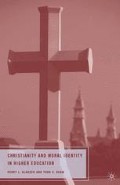Abstract
Although Stanley Fish argues that encouraging moral commitments beyond those related to being a good student or scholar should be avoided by universities, most universities actually defend and promote moral ideals or standards beyond those required to form professionals. For instance, one recent study of 110 nationally ranked liberal arts colleges found that 80 percent expressed both academic and nonacademic behavioral expectations.2
Underlying our modern talk of identity is the notion that questions of moral orientation cannot be solved in simply universal terms.
—Charles Taylor, Sources of the Self1
Access this chapter
Tax calculation will be finalised at checkout
Purchases are for personal use only
Preview
Unable to display preview. Download preview PDF.
Notes
Charles Taylor, Sources of the Self: The Making of the Modern Identity (Cambridge, MA: Harvard University Press, 1989), 28.
See Lee S. Duemer, Sheila Delony, Kathleen Donalson, and Amani Zaier, “Behavioral Expectations of 110 Nationally Ranked Liberal Arts Colleges,” Journal of College & Character 10, 2 (November 2008): 1–14.
Anne Colby, Thomas Ehrlich, Elizabeth Beaumont, Jason Stephens, Educating Citizens: Preparing America’s Undergraduates for Lives of Moral and Civic Responsibility (San Francisco, CA: Jossey-Bass, 2003), 52.
Derek Bok, Our Underachieving Colleges: A Candid Look at How Much Students Learn and Why They Should Be Learning More (Princeton: Princeton University Press, 2006);
Nannerl Keohane, Higher Ground: Ethics and Leadership in the Modern University (Durham, NC: Duke University Press, 2006);
Adrianna Kezar, Tony Chambers, and John Burkhardt, eds., Higher Education for the Public Good (San Francisco, CA: Jossey-Bass, 2005);
Harold Shapiro, A Larger Sense of Purpose (Princeton: Princeton University Press, 2005).
Carol Schneider, “Liberal Education and the Civic Engagement Gap,” in Higher Education for the Public Good, eds. Adrianna Kezar, Tony Chambers, and John Burkhardt (San Francisco, CA: Jossey-Bass, 2005), 127–145.
Jeffrey Stout, Democracy and Tradition (Princeton: Princeton University Press, 2004), 3.
John Lyons, “Upon What Authority Might We Teach Morality?” Philosophy and Literature 22, 1 (1998): 156.
D.C. Gilman, “Inaugural Address of Daniel Coit Gilman as First President of The Johns Hopkins University” (2007), http://www/jhu.edu/125th/links/gilrnan.html (accessed March 11, 2009).
Carol Gilligan, In a Different Voice: Psychological Theory and Women’s Development (Cambridge, MA: Harvard University Press, 1982);
Nel Noddings, Caring: A Feminine Approach to Caring and Moral Education (Berkeley: University California Press, 1984).
Bruce Wilshire, The Moral Collapse of the University: Professionalism, Purity and Alienation (Albany: State University of New York Press, 1990), 256.
One exception would be Harvey C. Mansfield, Manliness (New Haven, CT: Yale University Press, 2006).
John H. Robinson, “Why Schooling Is So Controversial in America Today,” Notre Dame Journal of Law, Ethics and Public Policy, 3 (1988), 532.
Alasdair MacIntyre, Dependent Rational Animals: Why Human Beings Need the Virtues (Peru, IL: Carus, 2001), 132.
Copyright information
© 2009 Perry L. Glanzer and Todd C. Ream
About this chapter
Cite this chapter
Glanzer, P.L., Ream, T.C. (2009). Who Are We? The Identities Universities Use To Provide Moral Orientation. In: Christianity and Moral Identity in Higher Education. Palgrave Macmillan, New York. https://doi.org/10.1057/9780230101494_6
Download citation
DOI: https://doi.org/10.1057/9780230101494_6
Publisher Name: Palgrave Macmillan, New York
Print ISBN: 978-1-349-37728-2
Online ISBN: 978-0-230-10149-4
eBook Packages: Palgrave Social & Cultural Studies CollectionSocial Sciences (R0)

